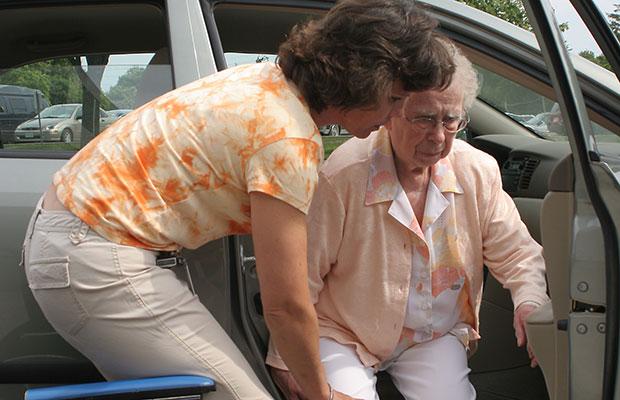
Patient Journey Map for Stroke Survivors & Families in the South East
For information, please click on the following link Patient Journey Map
Stroke Support Groups in Southeastern Ontario (Brochures)
Aphasia Conversation Groups
Aphasia Conversation Groups are being offered in Kingston, Perth, Brockville and Belleville. For further information, please see below.
- Aphasia Conversation Groups - Regional
- Aphasia Conversation Group - Kingston
- Aphasia Conversation Group - Belleville
- Aphasia Conversation Group - Brockville
- Aphasia Conversation Group - Perth
The Quinte Aphasia Conversation Group is collaboratively hosted by Quinte & District Rehabilitation and Community Care for South Hastings, the group is facilitated by a Speech-Language Pathologist. The group shares experiences, learns more about aphasia, supports each other and practices communicating. The group helped create this video as a way to enhance public and health care provider awareness of aphasia and to highlight key messages about what it’s like to live with aphasia.
-
Click here to view the video
Elyse Shumway is a Speech-Language Pathologist who specializes in communication disorders. Elyse works for the Aphasia Institute as the Manager of Clinical and Education Services, and as an adjunct lecturer at the University of Toronto, all while maintaining her role in private practice. Elyse was the keynote speaker for the recent Aphasia Advocacy event "The Right to Accessible Communication with Aphasia: It's a Basic Human Right".
- Click here to see Elyse's presentation.
Stroke Specific Community Exercise Groups (Posters)
- Regional Stroke-Specific Exercise Groups
- Trenton Stroke Recovery Exercise Program Poster
- Belleville Stroke Recovery Exercise Program Poster
- Brockville Senior Support Services - LLG Stroke Specific Exercise Group
- Smiths Falls Senior Support Services - LLG Stroke Specific Exercise Group
- Virtual Stroke Exercise Program - Kingston/Napanee/Quinte West
- Revved Up Exercise Program
- Revved Up @Home Exercise Program
Stroke-Specific Day Program
- VON Stroke Survivors Day Program - Bath
- Pathways to Stroke Rebound Day Program - Napanee
- Stroke Focused Day Program - Brockville
- Pathways to Stroke Rebound Day Program - Belleville
Southeast Healthline
Southeast Healthline
The SouthEasthealthline.ca has an online database of services available to people with stroke. This database includes information on rehabilitation, transportation, community services, psychosocial support, recreation, adapted equipment, home renovation and income assistance and has been designed to provide information on these topics and many others through a user-friendly format. The site may be accessed by:
- Clicking on Stroke Resources to directly access the database
- SouthEasthealthline One-Page Information Sheet
Indigenous Resources
Tyendinaga Home & Community Care offers a network of services provided by qualified staff to assist individuals to remain in their own home for as long as possible. Click on the links below to learn more.
- Home & Community Care website
Caregivers Are an Important Part of Stroke Recovery
It is important for caregivers to have access to information about stroke and also about their new role as a caregiver. The Stroke Support Groups in Southeastern Ontario include caregivers. The following are links to excellent sources of information when caring for a person recovering from stroke.
Supports for Caregiver of Persons Living with the Effects of Stroke, May 2022
A Guide to Choosing a Community Exercise Program
The Canadian Stroke Community-based Exercise Recommendations Update 2020: A Resource for Community-based Exercise Providers(link is external), is an evidence-based resource designed to help safely incorporate exercise programs in the community for individuals who have experienced a stroke. The resources include the recommendations in full, an “At-a-Glance” document that allows for a quick review, and a “Choosing a Community Exercise Program after Stroke” document to assist with the selection of an appropriate exercise program.
The Canadian Stroke Community-based Exercise Guidelines are available under Guidelines & Recommendations
**NEW** After Stroke Care - Emotional Well-Being and Counselling Resource
Stroke has effects that you cannot see. Changes in the way you feel can have a big impact on your life. The emotions you have throughout your recovery journey can be intense and change quickly. Intense feelings are a NORMAL reaction to a big health event, but can also be a result of a brain injury from a stroke. People who have had a stroke are at higher risk for developing depression. (Your Stroke Journey, Heart and Stroke Foundation, 2023). IT IS OK TO NEED HELP. Sharing your feelings, as hard as it may be, is a step toward meeting your recovery goals.
The following resource contains general emotional well-being and counselling resources to help you find the support that fits your needs. This resource was developed in response to Community Consultation (2023). One of the four key themes that emerged was Well-being and Mental Health and one of the top five recommendations was support for mental health.
For any questions or comments, contact Sandra Liu, Regional Community & LTC Coordinator at sandra.liu@kingstonhsc.ca or by phone at 1-613-532-2728.
- After Stroke Care - Emotional Well-Being and Counselling Resource - a resource for people living with stroke and their care partners - shaped by insights from the stroke community.
Return to Work Toolkit
This Return to Work Toolkit provides stroke survivors, family members and healthcare providers with assistance to navigate the process of returning to work including information on local and provincial resources and an online Job Readiness Self-Assessment Guide.
- Introduction to the Return To Work Toolkit
- Benefits Questionnaire
- Financial Supports
- Return to Work Resources
- Hastings, Prince Edward Fact Sheet
- Kingston, Frontenac, Lennox and Addington Fact Sheet
- Lanark, Leeds and Grenville Fact Sheet
- Volunteering After Stroke
- Literature Review
With appreciation to the Stroke Network of Southwestern Ontario for their willingness to share the resources within their Return to Work Toolkit.


